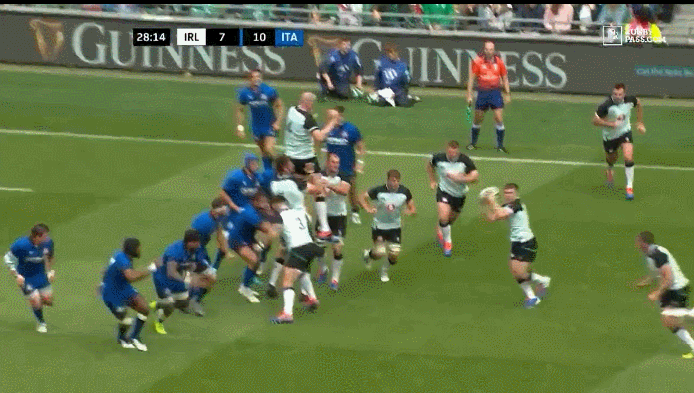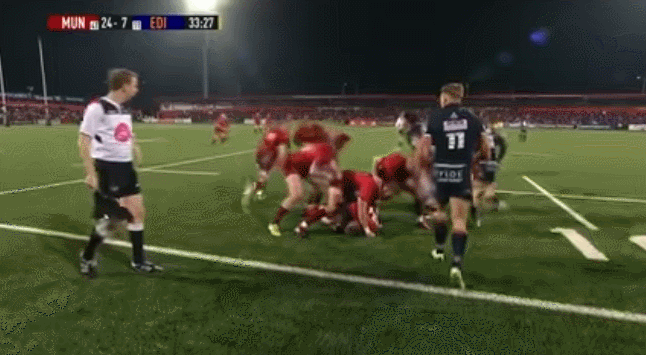

Share
11th August 2019
02:14pm BST

 Direct running is obviously a real strength of Farrell's game. At one point during the first-half he very nearly steamrolled his way through Ian McKinley and over the line from a five-metre scrum only to fall inches short of the chalk.
Farrell can be blunt when needed but he also has the ability to show very soft hands and his pass to Carbery for his first-half try was a perfect example of his delicate touch.
https://twitter.com/SportsJOEdotie/status/1160183397605658626
It's an area of his game that Schmidt has noticed for some time now and a facet he highlighted as a strength before including him in Ireland's Six Nations match with Wales last year.
Direct running is obviously a real strength of Farrell's game. At one point during the first-half he very nearly steamrolled his way through Ian McKinley and over the line from a five-metre scrum only to fall inches short of the chalk.
Farrell can be blunt when needed but he also has the ability to show very soft hands and his pass to Carbery for his first-half try was a perfect example of his delicate touch.
https://twitter.com/SportsJOEdotie/status/1160183397605658626
It's an area of his game that Schmidt has noticed for some time now and a facet he highlighted as a strength before including him in Ireland's Six Nations match with Wales last year.
"He kind of found his feet a bit against Fiji, he was really good against Argentina and I think he showed there's a bit more to Chris Farrell than a bludgeon - nice soft skills and a tight pass, he's got a good length in his pass," said Schmidt. "He's actually got pretty good kicking skills and I thought his defensive acumen on the day against Argentina... he closed the space down really well. "They'd be probably some of the things that we'd volunteer as the strengths we see with Chris."Farrell can deliver the ball to teammates as a link or as a first receiver but he's also capable at drawing in defenders and releasing the ball just before contact.
 Here against Edinburgh last season we can see a really well worked move from Munster where Farrell creates the overlap by drawing in two defenders and feeding the ball out the back to J.J. Hanrahan, who picks out Mike Haley who then puts Andrew Conway away in the corner.
In the same game we can again see Farrell deliver a nice pass to Haley after Munster do an excellent job at realigning on the short side.
Here against Edinburgh last season we can see a really well worked move from Munster where Farrell creates the overlap by drawing in two defenders and feeding the ball out the back to J.J. Hanrahan, who picks out Mike Haley who then puts Andrew Conway away in the corner.
In the same game we can again see Farrell deliver a nice pass to Haley after Munster do an excellent job at realigning on the short side.
 Munster number up well, Juan Pablo Socino rushes out of the line and is swatted away by Farrell who accelerates through the gap and draws the full-back in before composing himself and giving the ball to Haley who finds Earls from there.
Farrell has shown for both club and country that he can play direct when needed, that he can make forceful hits that prevent the opposition from getting over the gainline and that he has much better hands than what may be expected for a centre of his size and frame.
Ireland struggled for creativity at times during the Six Nations with the second fewest metres made and the second fewest clean breaks made despite having the most carries of any team in the tournament.
Farrell may help improve both areas if selected. The difficult question for Schmidt has always been who to play in the middle when Ringrose, Aki and Henshaw are all fit and healthy.
Farrell hasn't made that process any easier.
Munster number up well, Juan Pablo Socino rushes out of the line and is swatted away by Farrell who accelerates through the gap and draws the full-back in before composing himself and giving the ball to Haley who finds Earls from there.
Farrell has shown for both club and country that he can play direct when needed, that he can make forceful hits that prevent the opposition from getting over the gainline and that he has much better hands than what may be expected for a centre of his size and frame.
Ireland struggled for creativity at times during the Six Nations with the second fewest metres made and the second fewest clean breaks made despite having the most carries of any team in the tournament.
Farrell may help improve both areas if selected. The difficult question for Schmidt has always been who to play in the middle when Ringrose, Aki and Henshaw are all fit and healthy.
Farrell hasn't made that process any easier.Explore more on these topics: